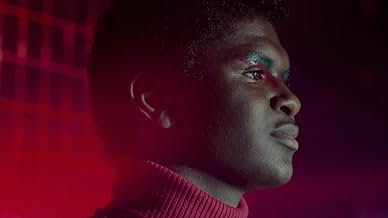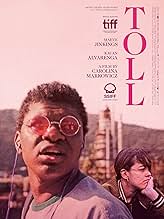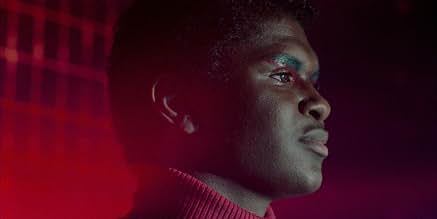Añade un argumento en tu idiomaSuellen, a toll booth attendant, uses her job to help a gang of thieves steal watches so that she can afford to send her son to a gay conversion workshop.Suellen, a toll booth attendant, uses her job to help a gang of thieves steal watches so that she can afford to send her son to a gay conversion workshop.Suellen, a toll booth attendant, uses her job to help a gang of thieves steal watches so that she can afford to send her son to a gay conversion workshop.
- Premios
- 21 premios y 22 nominaciones en total
Imágenes
Roberto Marchese
- Sr. Vitaly
- (as Antonio Roberto Marchese)
Argumento
¿Sabías que...?
- CuriosidadesOne of the six films pre-selected by the Brazilian Academy of Cinema and Audiovisual Arts to compete for a spot for Best International Film at the 2024 Oscars.
- Banda sonoraFür Elise
Written by Ludwig van Beethoven
Reseña destacada
"Toll" is one of those films that teases the audience with sensitivity and irony, while opening doors for deep reflections on morality, affection, and the dangers of a society that, in the name of the "greater good," pushes painful contradictions. Directed and written by Carolina Markowicz, the movie dives into the relationship between a mother, Suellen, and her son, Tiquinho (Kauan Alvarenga), with rare depth. Suellen, played intensely by Maeve Jinkings, lives in a constant duality: she loves her son, but her values, shaped by religious and social pressures, keep her from fully accepting who he is. This mix of love and incomprehension is what makes the film so human and, at the same time, so critical.
The movie opens with a scene that sets the tone right away: the camera follows Suellen waking up in a way that's almost voyeuristic, making it clear we're about to witness a life in its most intimate nuances. The narrative unfolds in a nearly documentary style, following the protagonist as she goes about her day, navigating the pressures of a society demanding that she show "acceptable" behavior for her son, who freely expresses himself with makeup and lip-syncs to foreign songs. Jinkings' performance hits the mark as she communicates the anguish and love driving her contradictory actions, often with just subtle expressions. This clash between genuine love and the desperate search for a "cure" for her son's differences is the heart of the film and reflects the hypocrisy of social norms that suppress individual freedom for the sake of questionable morality.
The film's aesthetic, with its raw, unpolished look, adds to the sense of closeness and realism. Markowicz goes for a color palette that keeps everything purposefully dull, except for moments when Tiquinho appears in his videos, lit by the artificial, colorful lights he uses. It's a contrast that not only highlights the importance of these spaces in Tiquinho's life but also the emotional emptiness of Suellen's world. The choice to film so naturally, without idealized angles or clean-cut scenes, makes the story feel familiar, reminding the audience that this reality is all too common for many families facing the weight of conflicting social expectations.
In this setting, one of the film's most iconic scenes happens during a "therapy" session with a pastor, where Markowicz leaves the hypocrisy blatantly exposed. The setting, with a vibrant bird painting in the background contrasting with the pastor, tired and lacking any real passion, emphasizes the emptiness of the religious practice on display. These scenes are loaded with irony, especially when the pastor shows images on a monitor and talks about the "danger" represented by sexuality. By presenting these scenes in such a straightforward and almost comic way, the film mocks the idea that repression can "cure" any orientation, a point that's amplified by Tiquinho's own reaction, observing it all with a mix of disbelief and mild sarcasm.
One of "Toll"'s strengths is how Markowicz builds the story without rushing, allowing the audience to get familiar with the characters and feel the weight of Suellen's choices before the situation truly escalates. Instead of racing to a high-stakes climax, the movie slowly builds a sense of dread and inevitability. Through this pace, we see Suellen sinking deeper into questionable decisions, all in the name of paying for a "cure" for her son, leading her down an illegal path. This arc reflects how desperation and fear of social norms can blur ethical boundaries, a theme that grows ever more evident and impactful throughout the movie.
At the heart of "Toll" lies the question of cost - the "toll" Suellen pays, not only in money but with her integrity and her relationship with her son. With every attempt to shape Tiquinho into something "acceptable," Suellen distances herself from who he really is, creating a gap that widens with each choice. This emotional "toll" builds up a weight the audience feels palpably, and the film's title, which at first seemed to refer only to Suellen's job, reveals itself as a metaphor for the losses she endures while trying to "save" her son.
The performances by Jinkings and the young Kauan Alvarenga as Tiquinho are key to the film's success. Alvarenga manages to show the complexity of a teenager who, while confident in his choices, carries the insecurities typical of his age. The mother-son dynamic is painful to watch, as it reflects the reality of many families where love is present but tangled in the expectations that stifle individuality. This is one of "Toll"'s richest aspects: although the story is deeply critical, Markowicz never judges Suellen, portraying her as a woman doing what she believes is best for her son, even if she's blinded by her own morality.
Ultimately, "Toll" is a movie that makes you laugh, cry, and think, often all at once. It challenges the audience to question what it truly means to love someone and what the limits of that love are in a world full of rules that make no sense. It's a satire that pokes at norms subtly yet effectively, leaving you with an uncomfortable feeling that maybe we're all paying a toll by trying to fit our lives into molds that, deep down, don't work for anyone.
The movie opens with a scene that sets the tone right away: the camera follows Suellen waking up in a way that's almost voyeuristic, making it clear we're about to witness a life in its most intimate nuances. The narrative unfolds in a nearly documentary style, following the protagonist as she goes about her day, navigating the pressures of a society demanding that she show "acceptable" behavior for her son, who freely expresses himself with makeup and lip-syncs to foreign songs. Jinkings' performance hits the mark as she communicates the anguish and love driving her contradictory actions, often with just subtle expressions. This clash between genuine love and the desperate search for a "cure" for her son's differences is the heart of the film and reflects the hypocrisy of social norms that suppress individual freedom for the sake of questionable morality.
The film's aesthetic, with its raw, unpolished look, adds to the sense of closeness and realism. Markowicz goes for a color palette that keeps everything purposefully dull, except for moments when Tiquinho appears in his videos, lit by the artificial, colorful lights he uses. It's a contrast that not only highlights the importance of these spaces in Tiquinho's life but also the emotional emptiness of Suellen's world. The choice to film so naturally, without idealized angles or clean-cut scenes, makes the story feel familiar, reminding the audience that this reality is all too common for many families facing the weight of conflicting social expectations.
In this setting, one of the film's most iconic scenes happens during a "therapy" session with a pastor, where Markowicz leaves the hypocrisy blatantly exposed. The setting, with a vibrant bird painting in the background contrasting with the pastor, tired and lacking any real passion, emphasizes the emptiness of the religious practice on display. These scenes are loaded with irony, especially when the pastor shows images on a monitor and talks about the "danger" represented by sexuality. By presenting these scenes in such a straightforward and almost comic way, the film mocks the idea that repression can "cure" any orientation, a point that's amplified by Tiquinho's own reaction, observing it all with a mix of disbelief and mild sarcasm.
One of "Toll"'s strengths is how Markowicz builds the story without rushing, allowing the audience to get familiar with the characters and feel the weight of Suellen's choices before the situation truly escalates. Instead of racing to a high-stakes climax, the movie slowly builds a sense of dread and inevitability. Through this pace, we see Suellen sinking deeper into questionable decisions, all in the name of paying for a "cure" for her son, leading her down an illegal path. This arc reflects how desperation and fear of social norms can blur ethical boundaries, a theme that grows ever more evident and impactful throughout the movie.
At the heart of "Toll" lies the question of cost - the "toll" Suellen pays, not only in money but with her integrity and her relationship with her son. With every attempt to shape Tiquinho into something "acceptable," Suellen distances herself from who he really is, creating a gap that widens with each choice. This emotional "toll" builds up a weight the audience feels palpably, and the film's title, which at first seemed to refer only to Suellen's job, reveals itself as a metaphor for the losses she endures while trying to "save" her son.
The performances by Jinkings and the young Kauan Alvarenga as Tiquinho are key to the film's success. Alvarenga manages to show the complexity of a teenager who, while confident in his choices, carries the insecurities typical of his age. The mother-son dynamic is painful to watch, as it reflects the reality of many families where love is present but tangled in the expectations that stifle individuality. This is one of "Toll"'s richest aspects: although the story is deeply critical, Markowicz never judges Suellen, portraying her as a woman doing what she believes is best for her son, even if she's blinded by her own morality.
Ultimately, "Toll" is a movie that makes you laugh, cry, and think, often all at once. It challenges the audience to question what it truly means to love someone and what the limits of that love are in a world full of rules that make no sense. It's a satire that pokes at norms subtly yet effectively, leaving you with an uncomfortable feeling that maybe we're all paying a toll by trying to fit our lives into molds that, deep down, don't work for anyone.
- heyflp
- 7 nov 2024
- Enlace permanente
Selecciones populares
Inicia sesión para calificar y añadir a tu lista para recibir recomendaciones personalizadas
- How long is Toll?Con tecnología de Alexa
Detalles
Taquilla
- Recaudación en todo el mundo
- 1095 US$
- Duración1 hora 42 minutos
- Color
- Relación de aspecto
- 1.66 : 1
Contribuir a esta página
Sugerir un cambio o añadir el contenido que falta






















